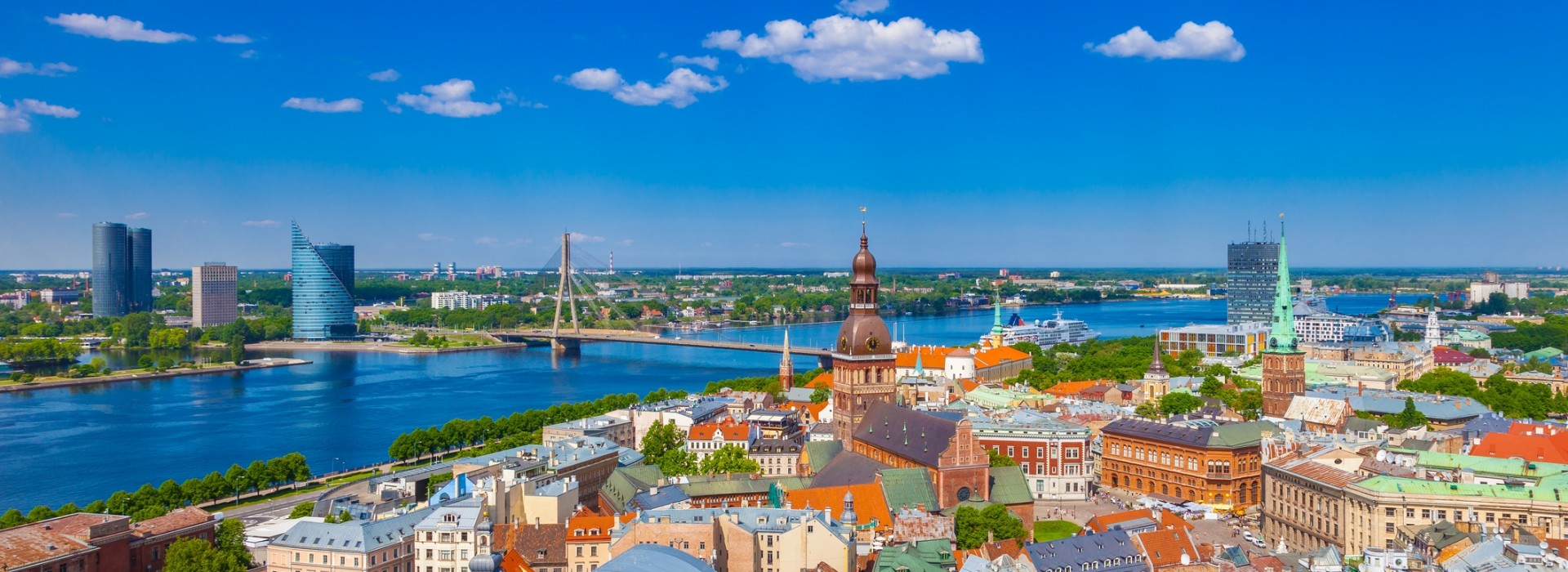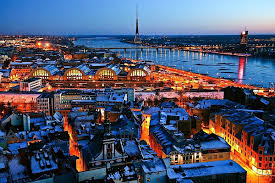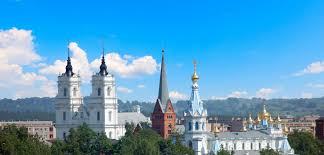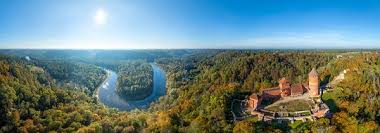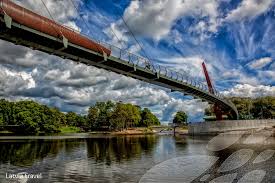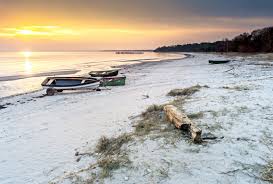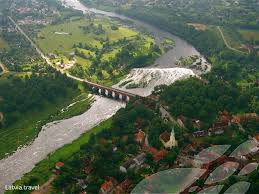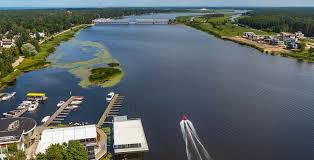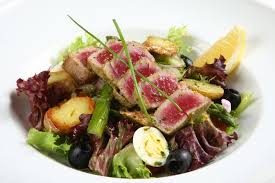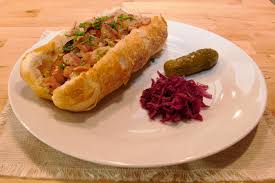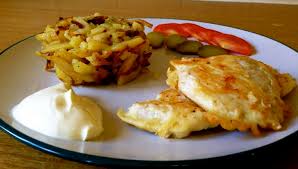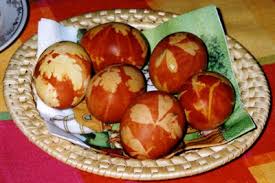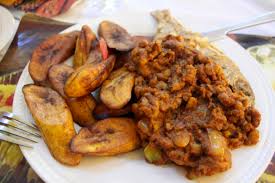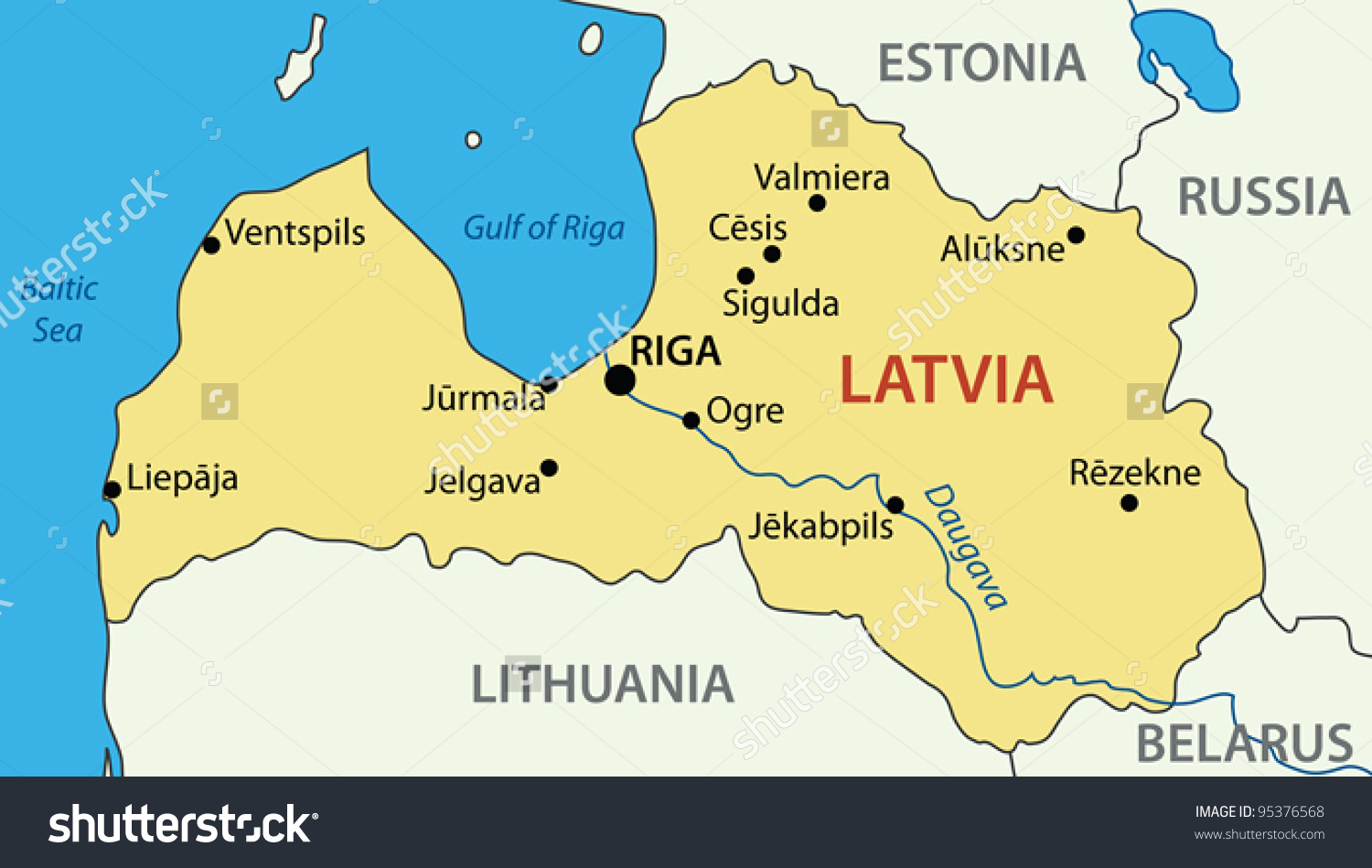Latvia (Latvian: Latvija [ˈlatvija]), officially the Republic of Latvia (Latvian: Latvijas Republika), is a country in the Baltic region of Northern Europe, one of the three Baltic states. It is bordered by Estonia to the north, Lithuania to the south, Russia to the east, and Belarus to the southeast, as well as amaritime border to the west alongside Sweden. Latvia has 2,070,371 inhabitants and a territory of 64,589 km2 (24,938 sq mi). The country has a temperate seasonal climate. Latvia is a democratic parliamentary republic established in 1918. The capital city is Riga, the European Capital of Culture 2014. Latvian is the official language. Latvia is a unitary state, divided into 118 administrative divisions, of which 109 are municipalities and 9 are cities.
Geography
Latvia lies on the eastern shores of the Baltic Sea on the level northwestern part of the rising East European platform, between Estonia and Lithuania. About 98% of the country lies under 200 m (656 ft) elevation. With the exception of the coastal plains, the ice age divided Latvia into three main regions: the morainic Western and Eastern uplands and the Middle lowlands. Latvia holds over 12,000 rivers, only 17 of which are longer than 100 km (60 mi), and over 3,000 small lakes, most of which are eutrophic. The major rivers include the Daugava, the Lielupe, the Gauja, the Venta and the Salaca. Woodlands, more than half of which are pinewoods, cover around 41% of the country. Other than peat, dolomite, and limestone, natural resources are scarce. Latvia has 531 km (330 mi) of sandy coastline, and the ports of Liepāja and Ventspils provide important warm-water harbors for the Baltic coast.
Area of Latvia is larger than the area of many European countries (Albania, Belgium, Bosnia and Herzegovina, Croatia, Cyprus, Denmark, Estonia, Luxembourg,Macedonia, Malta, Montenegro, Netherlands, Slovakia, Slovenia or Switzerland). Its strategic location has instigated many wars between rival powers on its territory. As recently as 1944, the USSR granted Russia the Abrene region, which Latvia contested after the dissolution of the Soviet Union.
Latvia encompasses 64,589 square kilometers and is an extension of the East European Plain. Its flat terrain differs little from that of its surrounding neighbors. Latvias only distinct border is the Baltic Sea coast, which extends for 531 kilometers. Its neighbors include Lithuania on the south (453 kilometers of common border), Estonia on the north (267 kilometers), Russia on the east (217 kilometers), and Belarus on the southeast (141 kilometers). Prior to World War II, Latvia bordered eastern Poland, but as a result of boundary changes by the Soviet Union, this territory was attached to Belarus. Also, in 1944 Russia annexed the northeastern border district of Latvia, known as Abrene, including the town of Pytalovo.
Latvia cannot claim valuable natural resources. Nevertheless, the abundant presence of such materials as limestone for cement (6 billion cubic meters or 8 billion cubic yards), gypsum (165 million cubic meters or 216 million cubic yards), high-quality clay (375 million cubic meters or 490 million cubic yards), dolomite (615 million cubic meters or 804 million cubic yards), peat (480 million tonnes, 530 million short tons or 470 million long tons), and construction materials, including gravel and sand, satisfy local needs. Fish from the Baltic Sea is another potential export resource. Amber, million-year-old chunks of petrified pine pitch, is often found on the beaches of the Baltic Sea and is in high demand for jewelry. It has also had a symbolic impact on the country, which is often called Dzintarzeme, or Amberland. The future may hold potentially more valuable resources if oil fields are discovered in Latvian territorial waters, as some geologists have predicted.
Population
Total population of 1.93 million
Jews for 7.4%,
Poles for 3.4%
Belarusians 3.3%
Ukrainians 2.2%
Poles 2.2%
Lithuanians 1.2%
Romani people 0.3%
Germans 0.1%
Estonians 0.1%
Latvians formed 68.3%
others 1.3%
There were 290,660 non-citizens living in Latvia or 14.1%
Transport
Railways
Latvian Railways is the main state-owned railyway company in Latvia. Its daughter companies both carry out passengers services as well as carry a large quantity of freight cargo, and freight trains operate over the whole current passenger network, and a number of lines currently closed to passenger services.
There is also a narrow gauge railway between Gulbene and Aluksne, operated by the Industrial Heritage Trust, using Russian and Polish built heritage rolling stock. Three narrow gauge trains a day operate on the 33 km route between the two towns.
total: 2,347 km
Russian gauge: 2,314 km 1,520 mm (4 ft 11 27⁄32 in) gauge (270 km electrified)
narrow gauge: 33 km 750 mm (2 ft 5 1⁄2 in) gauge (2002)
Airports
Riga International Airport is the only major airport in Latvia, carrying around 5 million passengers annually. It is the largest airport in the Baltic states and has direct flights to over 80 destinations in 30 countries including a nonstop transatlantic flight to New York-JFK operated by Uzbekistan Airlines year-round. It is also the main hub of airBaltic.
In the recent years airBaltic operated also in Liepāja International Airport as well as Ventspils International Airport but operations in both of these airports were soon ceased.
Currently there are plans for further development in several regional airports, including Jūrmala Airport, Liepāja, Ventspils as well as Daugavpils International Airport.
Airfields
As of 2003, there were a total of 51 airfields in Latvia, with 27 of them having paved runways.
Airports - with paved runways total: 27
2,438 to 3,047 m: 7
1,524 to 2,437 m: 2
914 to 1,523 m: 2
under 914 m: 16 (2003)
Airports - with unpaved runways total: 24
2,438 to 3,047 m: 1
1,523 to 2,438 m: 2
914 to 1,523 m: 1
under 914 m: 20 (2003)
Greetings
|
English |
latviešu valoda (Latvian) |
|
Kā jums klājas? (frm) |
|
|
Reply to How are you? |
|
|
Kā tevi sauc? (inf) |
|
|
Veiksmi! |
|
|
Cheers! |
Uz veselību! |
|
Es saprotu |
|
|
Jā |
|
|
Nē |
|
|
Varbūt |
|
|
Es nezinu |
|
|
Vai Jūs nevarētu Lūdzu to uzrakstīt? |
|
|
Do you speak Latvian? |
Vai Jūs runājat latviski? |
|
Yes, a little |
|
|
How do you say ... in Latvian? |
|
|
Piedodiet! (frm) |
|
|
Piedodiet! (frm) |
|
|
Reply to thank you |
|
|
Man tevis pietrūkst |
|
|
Veseļojies |
|
|
Mans transportlīdzeklis uz gaisa spilvena ir pilns ar zušiem |
Sights
Cuisine
Posters
Map
Itineraries
| Sr. No. | Itinerary Name | File |
